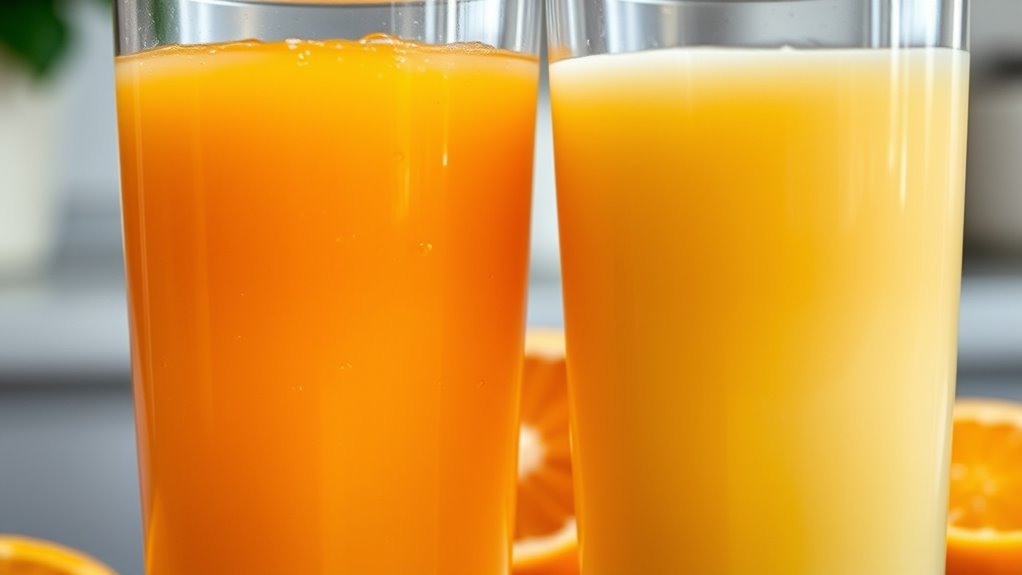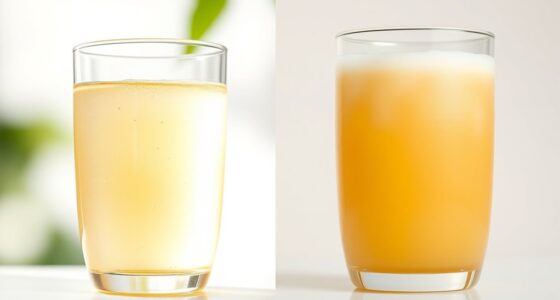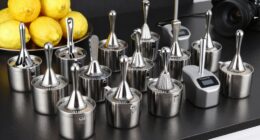Fresh orange juice retains more vitamin C because it’s processed without heat, keeping its delicate nutrients intact. Pasteurized juice, on the other hand, loses some vitamin C during heating, often retaining around 70% of its original amount. If you want the highest vitamin C benefits, opt for fresh or minimally processed options. To learn how processing impacts nutrient levels and ways to maximize your intake, keep exploring the details behind orange juice production.
Key Takeaways
- Fresh orange juice retains approximately 100% of its vitamin C content when refrigerated immediately after extraction.
- Pasteurized orange juice typically contains about 70% of the original vitamin C due to heat degradation during processing.
- The heat involved in pasteurization causes some loss of vitamin C, reducing its antioxidant capacity compared to fresh juice.
- Proper storage of fresh juice at 0–4°C helps preserve its higher vitamin C levels over time.
- Choosing minimally processed, cold-pressed juice ensures maximum vitamin C retention compared to standard pasteurized products.
Understanding Vitamin C and Its Importance
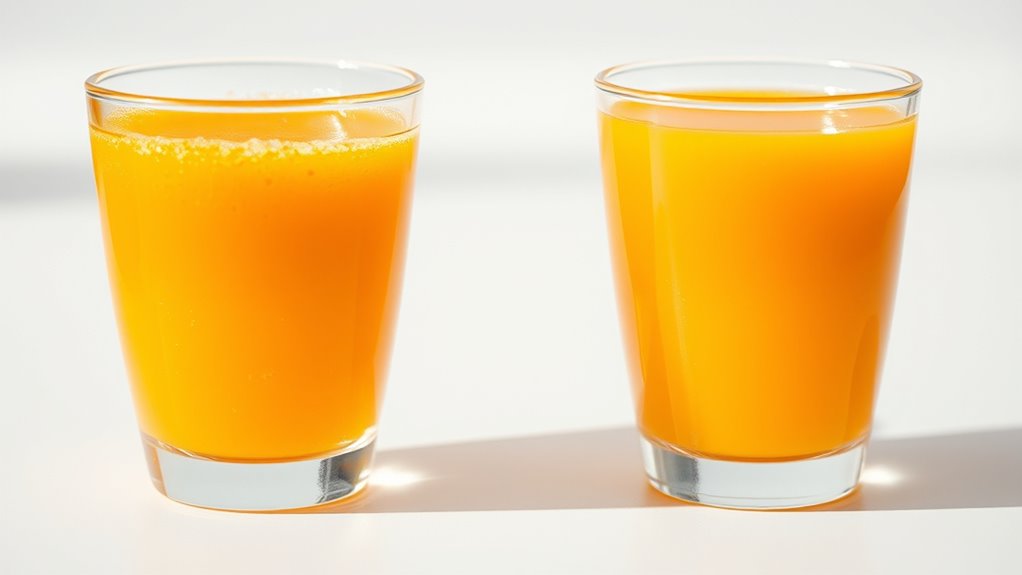
Vitamin C, also known as ascorbic acid, is an essential nutrient that your body needs to stay healthy. It plays a fundamental role in supporting your immune system, helping your body fight off illnesses. As an antioxidant, vitamin C neutralizes free radicals, reducing oxidative stress and protecting your cells from damage. This antioxidant benefit is crucial for maintaining overall health and preventing chronic diseases. Without enough vitamin C, you might experience weakened immunity and slower wound healing. Since your body can’t produce vitamin C naturally, you need to obtain it through your diet, especially from fruits like oranges. Ensuring adequate intake helps boost your immune support and keeps your body’s defenses strong. Understanding the importance of vitamin C highlights why consuming orange juice can be a valuable part of your nutrition. Additionally, adequate vitamin C intake supports collagen synthesis, which is essential for healthy skin, cartilage, and blood vessels. Proper absorption of vitamin C can also be affected by food processing methods, which may reduce its nutritional value in some cases. The storage and handling of orange juice can further influence its vitamin C content, underscoring the importance of fresh or properly processed products. Moreover, processing techniques can impact the retention of vitamin C in fruit juices, making the choice of fresh or minimally processed juice preferable.
How Orange Juice Is Made: Fresh vs. Pasteurized
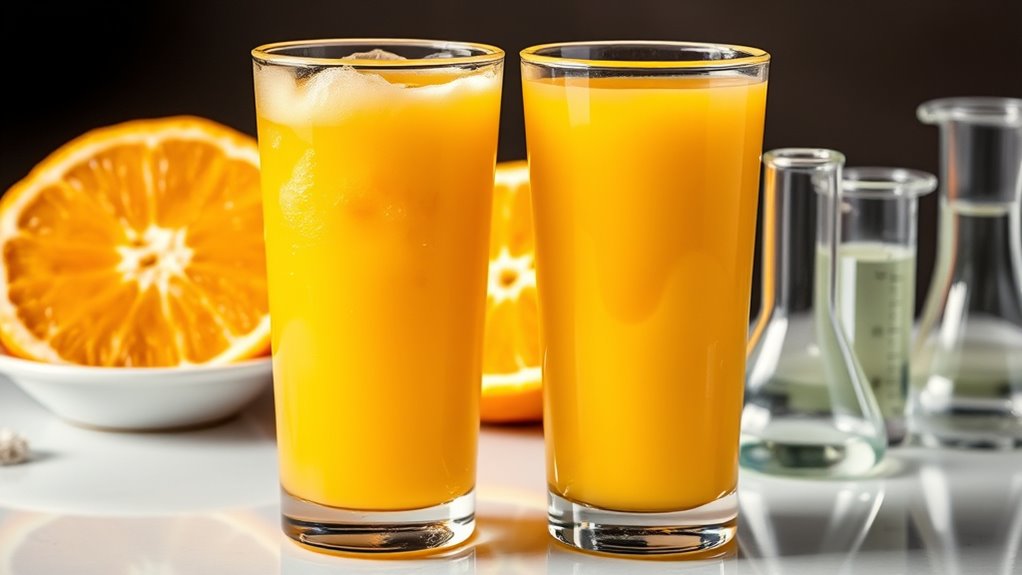
Orange juice can be made through two main methods: fresh extraction and pasteurization. During juice extraction, oranges are pressed to extract the liquid. For fresh juice, this process is quick, preserving nutrients, including vitamin C. Pasteurization involves heating the juice to kill bacteria, extending shelf life. This heating occurs in the pasteurization process, which can reduce vitamin C content. Here’s a comparison:
| Method | Juice Extraction Process | Effect on Vitamin C |
|---|---|---|
| Fresh | Cold pressing, minimal processing | High vitamin C retention |
| Pasteurized | Heating during pasteurization | Some vitamin C loss |
| Shelf Life | Shorter | Longer |
| Nutrient Content | Better preserved in fresh juice | Slightly reduced in pasteurized juice |
The Impact of Heat on Vitamin C Content
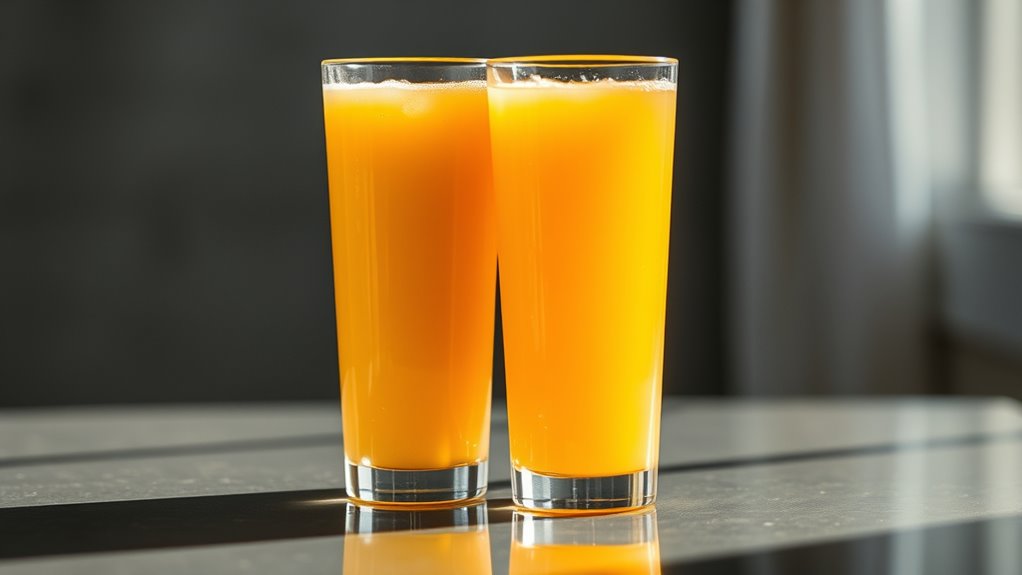
Heat substantially impacts the vitamin C content in orange juice, especially during pasteurization. Vitamin stability decreases when exposed to high temperatures because vitamin C is highly heat sensitive. As you heat the juice, some of the vitamin C breaks down, reducing its nutritional value. The longer and hotter the pasteurization process, the more vitamin C is lost. This heat sensitivity means that even though pasteurized juice is safer and lasts longer, it may contain less vitamin C than fresh juice. Understanding this impact helps you make informed choices about your orange juice. If maximizing vitamin C intake is your goal, fresh juice generally retains more nutrients because it’s not subjected to high heat.
Comparing Nutritional Profiles: Fresh and Pasteurized Juices
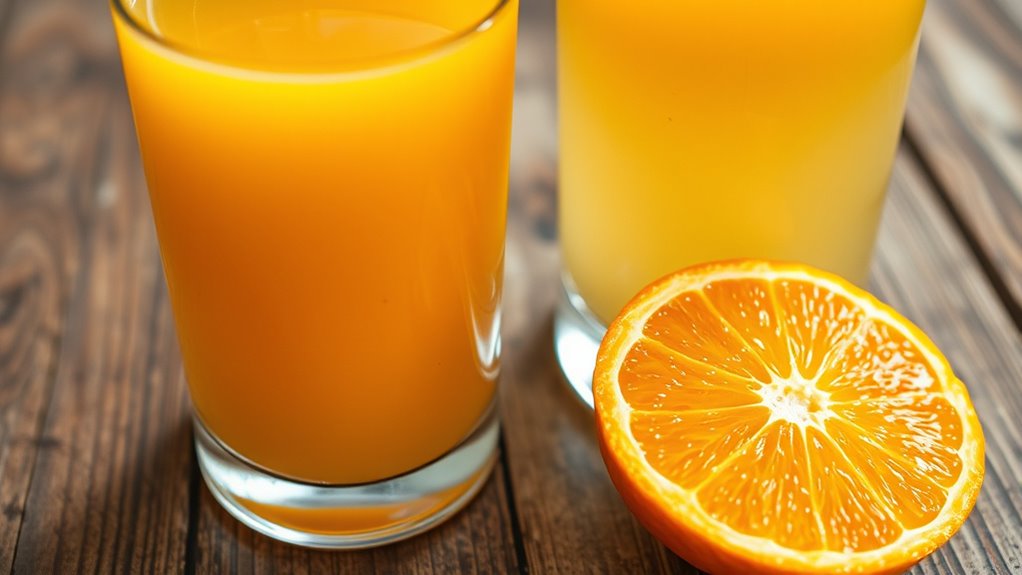
When comparing fresh and pasteurized orange juices, it’s important to contemplate how processing methods affect their nutritional profiles. Pasteurization can slightly reduce vitamin levels but helps preserve flavor by controlling bacteria. Fresh juice often retains more nutrients, but its flavor may vary due to packaging effects and exposure to air. Here’s a quick comparison:
| Aspect | Fresh Juice | Pasteurized Juice |
|---|---|---|
| Nutritional Content | Higher in vitamins, fresher | Slightly lower due to heat |
| Flavor Preservation | Natural, delicate flavors | Consistent, processed flavor |
| Packaging Effects | Less stable, sensitive to air | More stable, sealed packaging |
| Shelf Life | Shorter | Longer |
| Texture | Thicker, pulp-rich | Smoother, uniform |
Understanding these differences helps you choose based on nutritional preference and flavor expectations.
Storage and Shelf Life Considerations
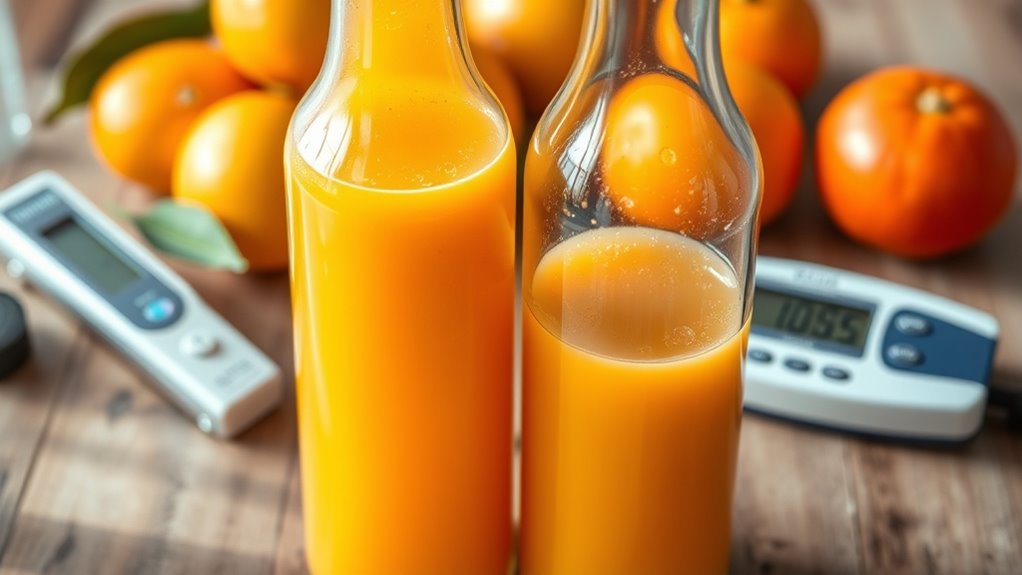
Proper storage is essential to maintaining the quality and safety of orange juice, especially since it’s highly perishable. To maximize freshness and preserve vitamin C content, consider these factors:
- Use packaging innovations like airtight bottles to reduce oxygen exposure.
- Keep your juice at the ideal storage temperature, ideally between 0–4°C, to slow nutrient degradation.
- Avoid temperature fluctuations, which can accelerate spoilage.
- Consume juice within the recommended shelf life, typically 7–10 days for fresh and longer for pasteurized varieties.
- Proper storage methods can also reduce volatile organic compounds, helping to maintain overall juice quality.
- Additionally, understanding vitamin C stability can guide optimal storage practices to prevent nutrient loss over time.
Scientific Studies on Vitamin C Retention

Numerous scientific studies have examined how different storage conditions impact vitamin C retention in orange juice. They reveal that pasteurization can reduce antioxidant stability, affecting vitamin C levels over time. Cold storage helps preserve vitamin C and flavor, but heat during pasteurization causes some loss. To illustrate this, consider the following data:
| Storage Method | Vitamin C Retention (%) | Effect on Flavor Preservation |
|---|---|---|
| Fresh, refrigerated | 100 | Excellent |
| Pasteurized, refrigerated | 70 | Slightly affected |
| Frozen | 90 | Good |
| Heated during processing | 60 | Noticeable flavor change |
These studies highlight the importance of storage and processing in maintaining vitamin C and flavor quality in orange juice. Understanding preservation methods can help consumers make informed choices about their juice options. Additionally, processing techniques play a vital role in nutrient retention and product quality. For example, pasteurization methods can vary in their impact on vitamin C preservation. The choice of processing method influences both the nutritional value and the sensory properties of the final product.
Tips for Maximizing Vitamin C Intake From Orange Juice
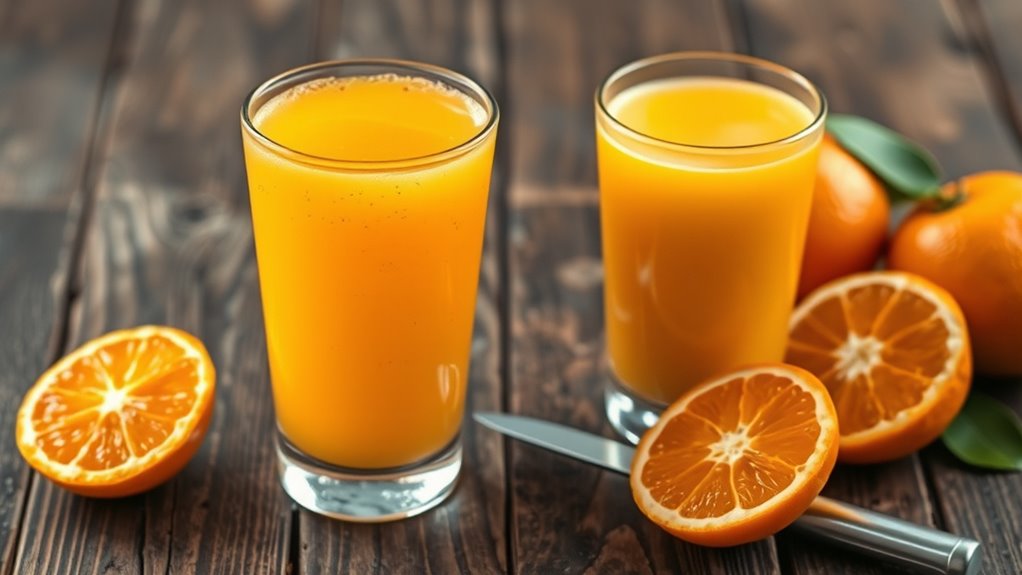
To get the most vitamin C from orange juice, choose fresh over pasteurized options whenever possible, since processing can reduce nutrient levels. Also, drink your juice soon after pouring, as vitamin C degrades over time and with exposure to light and air. Proper storage methods, such as refrigeration and airtight containers, help preserve vitamin C content for longer periods. Additionally, staying informed about food processing effects ensures that consumers make healthier choices to maximize nutrient intake. Incorporating advanced fraud detection techniques into quality control processes can further safeguard the integrity of nutritional data and research.
Fresh vs. Pasteurized Juice
While pasteurization helps guarantee the safety and extends the shelf life of orange juice, it can also reduce its vitamin C content. To maximize your intake, consider these tips:
- Choose fresh juice when possible, as it retains more juice clarity and vitamin C than processed versions.
- Check pulp content—more pulp often indicates less processing, preserving nutrients.
- Opt for minimally processed options labeled as “fresh” or “cold-pressed” for higher vitamin C levels.
- Store juice properly in a cool, dark place and consume soon after opening to prevent nutrient loss.
- Be aware of cookie categories used by brands, as some processing methods may impact nutrient retention.
- Pay attention to processing techniques that can influence the vitamin C content in orange juice.
- Incorporating recycled materials in packaging may also help preserve nutrients by reducing exposure to light and oxygen.
Optimal Serving Timing
For maximum vitamin C benefits, it’s best to drink orange juice shortly after opening it. Timing considerations are vital because vitamin C degrades over time when exposed to air and light. To preserve its nutritional value, serve the juice immediately after opening, ideally within the first 15-20 minutes. If you plan to enjoy it later, keep it refrigerated and reseal the container tightly to slow vitamin C loss. Serving suggestions include pouring small amounts into a glass just before drinking or pouring fresh servings to minimize exposure. Avoid leaving juice out at room temperature for extended periods. Additionally, nutrient retention can be improved by choosing fresh juice over pasteurized options, as pasteurization may cause some loss of vitamin C. By paying attention to timing considerations and following proper serving suggestions, you’ll maximize your vitamin C intake and enjoy the full health benefits of orange juice.
Making Informed Choices for Your Health
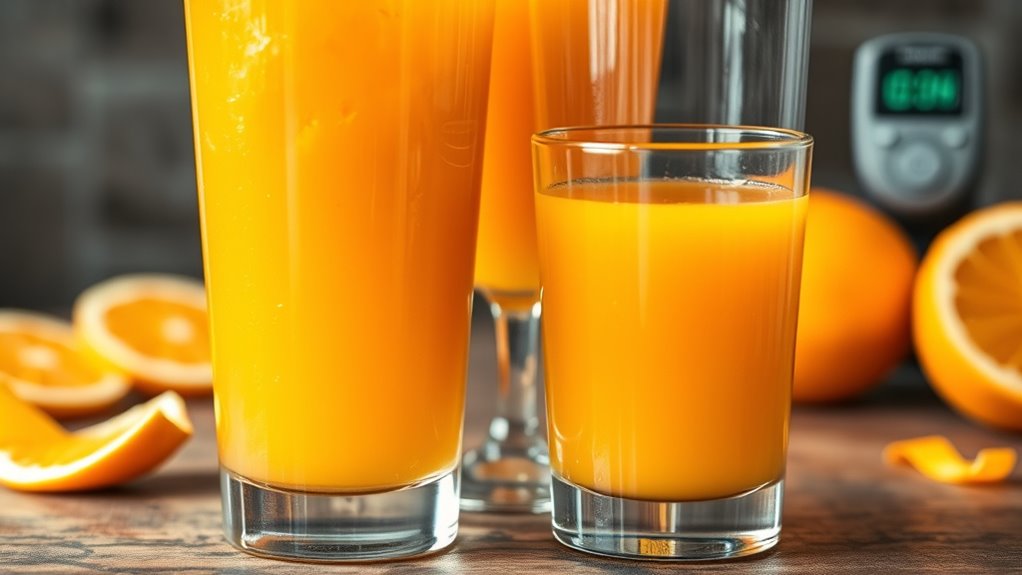
When choosing orange juice, you should consider the nutritional differences between options and how processing affects vitamin C content. The pasteurization process can reduce some nutrients, so selecting fresh or minimally processed juices may be healthier. Making informed choices helps you maximize the benefits and support your overall well-being. Additionally, understanding the trustworthiness of brands can ensure you select high-quality products. Incorporating knowledge of AI in food analysis can further assist in verifying the nutritional claims made by different brands. Being aware of the modern toilet features and maintenance can help in maintaining a clean and efficient bathroom environment.
Nutritional Differences Explained
Understanding the nutritional differences between orange juice varieties helps you make smarter choices for your health. Fresh juice often retains more juice antioxidants because minimal fruit processing preserves natural nutrients. Pasteurized juice may lose some vitamin C and antioxidants during heating, but it’s still a good source of nutrients. Here’s what to contemplate:
- Vitamin C Content: Fresh juice usually has higher vitamin C levels, supporting immune health.
- Juice Antioxidants: Less processed juices contain more natural antioxidants that combat free radicals.
- Fruit Processing: Extensive processing can degrade nutrients, reducing overall nutritional value.
- Preservation Techniques: Pasteurization extends shelf life but may slightly diminish nutrient levels.
Knowing these differences helps you choose juices that maximize health benefits and nutritional value.
Impact of Pasteurization Process
Pasteurization is a heat process that extends the shelf life of orange juice by killing harmful bacteria and enzymes. This process, however, also influences pasteurization effects on vitamin preservation. High temperatures can degrade sensitive nutrients like vitamin C, reducing its overall content in the juice. While pasteurization effectively eliminates pathogens, it may cause a slight decrease in vitamin levels compared to fresh juice. The extent of vitamin loss depends on the temperature and duration of the process. Some manufacturers use lower heat or alternative methods to better preserve nutrients while ensuring safety. Understanding these pasteurization effects helps you make informed choices about the orange juice you consume, balancing safety and nutritional value. Additionally, advances in processing techniques aim to minimize nutrient loss during pasteurization without compromising safety.
Choosing Healthier Options
Making informed choices about orange juice involves considering both its nutritional content and how it’s processed. To pick a healthier option, focus on these key factors:
- Flavor preservation – Fresh juice often retains more natural flavor and higher vitamin C levels than processed varieties.
- Nutritional value – Check labels for added sugars and preservatives; fresh or minimally processed juice usually offers better nutrients.
- Cost considerations – Fresh-squeezed or organic options may cost more but provide higher quality and fewer additives.
- Processing methods – Pasteurized juice extends shelf life but can reduce vitamin C and affect flavor; decide based on your priorities.
Balancing these aspects helps you make smarter, healthier choices while enjoying your favorite orange juice.
Frequently Asked Questions
Does Adding Preservatives Affect Vitamin C Levels in Orange Juice?
Adding preservatives can impact vitamin C stability, but it depends on the preservative types used. Some preservatives, like sulfur dioxide, may help preserve vitamin C by preventing oxidation, while others might cause degradation. You should check product labels to see which preservatives are added. Ultimately, the effect on vitamin C levels varies, so choosing juices with minimal or no preservatives can help retain more of this essential nutrient.
How Does Storage Temperature Influence Vitamin C Preservation?
You should know that storage temperature greatly impacts vitamin C preservation. Cooler temperatures promote better temperature stability, slowing down oxidation processes that degrade vitamin C. When you keep orange juice refrigerated, it retains more vitamin C because oxidation slows, whereas higher temperatures accelerate vitamin C loss. So, to maximize vitamin C, store your juice in the fridge, minimizing temperature fluctuations and keeping oxidation processes at bay.
Are Organic Orange Juices Higher in Vitamin C Than Conventional Ones?
You might notice organic orange juices often taste different, but they aren’t necessarily higher in vitamin C than conventional ones. Organic farming emphasizes natural methods, which can influence flavor, but vitamin C content depends more on freshness and processing. While some believe organic options retain more nutrients, scientific evidence shows vitamin C levels are similar across both types, with flavor differences mainly due to farming practices and varieties.
Can Vitamin C Levels Vary Between Different Orange Varieties?
Think of orange variety as different musical instruments, each producing a unique tune. Your vitamin C levels can definitely vary depending on the orange variety you choose. Some varieties are like high notes, packed with more vitamin C, while others play a softer tune. So, by selecting specific orange varieties, you can boost your vitamin C intake and enjoy the vibrant benefits that come with each type.
Does Consumer Packaging Impact Vitamin C Retention in Juice?
You might wonder if packaging impact affects vitamin C retention in juice. It does—clear bottles can allow light to degrade vitamin C, lowering its levels. Opaque or UV-protected packaging helps preserve nutrients. Consumer perception also plays a role; people often associate better packaging with higher quality and freshness. So, choosing juices in proper packaging guarantees you get more vitamin C, aligning with both health benefits and your expectations of quality.
Conclusion
Choosing between fresh and pasteurized orange juice can feel like deciding between a lightning bolt and a gentle spark. While pasteurization might reduce vitamin C, it still packs enough punch to boost your immune system—if you’re lucky. But if you want maximum vitamin C power that could potentially make your body a superhero fortress, go for fresh juice. Remember, your health’s worth more than a fleeting sip—so choose wisely and supercharge your day!
Susannah expertise lies in researching and compiling evidence-based content on juicing, nutrition, and overall health. She is committed to ensuring that The Juicery World offers accurate, up-to-date, and trustworthy information to empower readers to take control of their health. Susannah’s goal is to inspire individuals to embrace juicing as a way to nourish their bodies and live their best lives.

